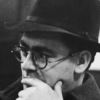Flann O'Brien

Flann O'Brien
Brian O'Nolanwas an Irish novelist, playwright and satirist, considered a major figure in twentieth century Irish literature. Born in Strabane, County Tyrone, he is regarded as a key figure in postmodern literature. His English language novels, such as At Swim-Two-Birds, and The Third Policeman, were written under the nom de plume Flann O'Brien. His many satirical columns in The Irish Times and an Irish language novel An Béal Bocht were written under the name Myles na gCopaleen...
NationalityIrish
ProfessionWriter
Date of Birth5 October 1911
CountryIreland
Flann O'Brien quotes about
Could Henry Ford produce the Book of Kells? Certainly not. He would quarrel initially with the advisability of such a project and then prove it was impossible.
The only result my father got for his money was the certainty that his son had laid faultlessly the foundation of a system of heavy drinking and could be always relied upon to make a break of at least twenty-five even with a bad cue.
I mean to say, whether a yarn is tall or small I like to hear it well told. I like to meet a man that can take in hand to tell a story and not make a balls of it while he's at it. I like to know where I am, do you know. Everything has a beginning and an end.
The continual cracking of your feet on the road makes a certain quantity of road come up into you. When a man dies they say he returns to clay but too much walking fills you up with clay far sooner (or buries bits of you along the road) and brings your death half-way to meet you. It is not easy to know what is the best way to move yourself from one place to another.
Having placed in my mouth sufficient bread for three minutes' chewing, I withdrew my powers of sensual perception and retired into the privacy of my mind, my eyes and face assuming a vacant and preoccupied expression. I reflected on the subject of my spare-time literary activities. One Beginning and one ending for a book was a thing I did not agree with. A good book may have three openings entirely dissimilar and inter-related only in the prescience of the author, or for that matter one hundred times as many endings.
After a time," said old Mathers disregarding me, "I mercifully perceived the errors of my ways and the unhappy destination I would reach unless I mended them. I retired from the world in order to try to comprehend it and to find out why it becomes more unsavoury as the years accumulate on a man's body. What do you think I discovered at the end of my meditations?" I felt pleased again. He was now questioning me. "What?" "That No is a better word than Yes," he replied.
He went home one evening and drank three cups of tea with three lumps of sugar in each cup, cut his jugular with a razor three times and scrawled with a dying hand on a picture of his wife goodbye, goodbye, goodbye.
The dusk was performing its customary intransitive operation of "gathering".
Why should anyone steal a watch when he could steal a bicycle?
Why be a dumb dud? Do your friends shun you? Do people cross the street when they see you approaching? Do they run up the steps of strange houses, pretend they live there and force their way into the hall while you are passing by? If this is the sort of person you are, you must avail yourself today of this new service. Otherwise, you might as well be dead.
I saw that my witticism was unperceived and quietly replaced it in the treasury of my mind.
I am completely half afraid to think.
still loved but deprived of grace
Do you know what I am going to tell you, he said with his wry mouth, a pint of plain is your only man. Notwithstanding this eulogy, I soon found that the mass of plain porter bears an unsatisfactory relation to its toxic content and I subsequently became addicted to brown stout in bottle, a drink which still remains the one that I prefer the most despite the painful and blinding fits of vomiting which a plurality of bottles has often induced in me.